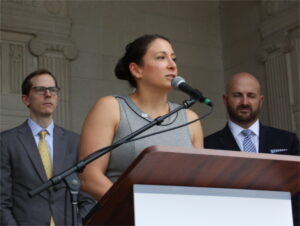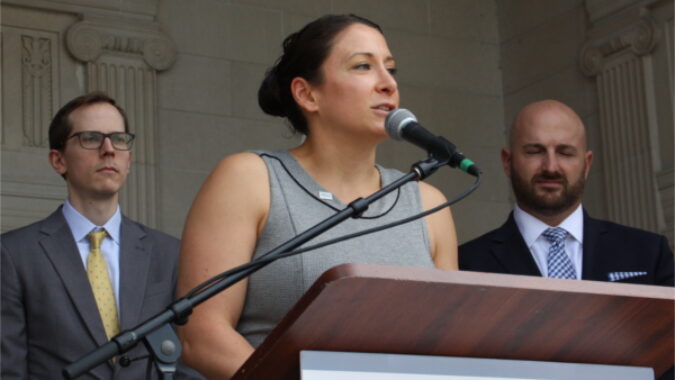
NJBIA Chief Government Affairs Officer Christine Buteas speaks at a press conference following the vote.
Legislation banning plastic bags, straws and polystyrene containers is the kind of environmental policy the state should avoid if it wants to get the maximum environmental benefit without hurting jobs and the economy, the New Jersey Business & Industry Association (NJBIA) said today.
Testifying before the Senate Environment and Energy Committee on S-2776, NJBIA Chief Government Affairs Officer Chrissy Buteas said NJBIA members take their responsibility to manage solid waste seriously, but they want the state to have clear and comprehensive goals before imposing new mandates on them.
“To date, the state has not released any analysis studying the impact of plastics as it relates to litter or other environmental concerns,” Buteas said. “We want to be sure that any measure impacting so many jobs will actually have the desired effect.”
Facts suggest the bill would have little impact on global plastics pollution as a whole. China and Indonesia, together, generated nearly one-third of all plastic bags, bottles and other debris that is washed into the Earth’s oceans, she noted. China alone created 8.82 metric tons of plastic waste per year compared to the United States’ 0.28 metric tons.
“While every nation must do its fair share in cleaning up this worldwide problem, we cannot expect the good people of our state to shoulder a disproportionate amount of the fiscal responsibility for the world’s bad actors,” Buteas said.
On the economic side, Buteas noted the plastics industry directly employs more than 18,000 people in New Jersey (17th most in the nation), with nearly 1 million jobs that could be indirectly impacted by the measure.
“Any effort to totally ban certain plastics consumption would decrease the need for plastics manufacturing and could jeopardize these jobs,” Buteas said. “While this action would greatly affect manufacturing, it would also negatively impact the transportation and packaging industry sectors as well. Jobs in construction, healthcare, food service, and others are also dependent on the plastics industry.”
Additionally, research suggests that a plastics ban may do more harm than good since many plastic products have a lower carbon footprint than many of the proposed alternatives. Other reusable bags may have a longer life, but require considerably more resources to produce. A more careful analysis would be better able to determine if banning plastic bags and straws is the best way to attack the problem.
“We need a statewide policy that addresses these issues in a thoughtful, comprehensive manner; one that recognizes the need and desire for a clean environment and a healthy, growing economy,” Buteas said.






